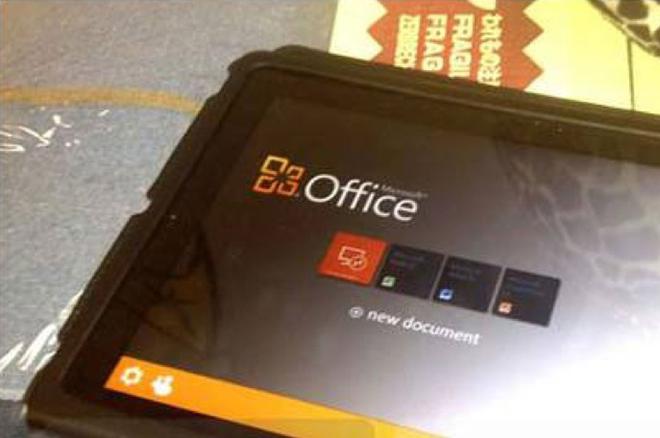Microsoft's reluctance to bring its industry-standard Office productivity suite to Apple's iPad may give the software giant a modicum of leverage in the new computing environment, but one analyst says that policy means Microsoft is leaving $2.5 billion a year on the table.
Morgan Stanley's Adam Holt says that, while Microsoft has so far held back from bringing Office to iOS, the ongoing popularity of Apple's mobile operating system may prove too big a draw, especially if Windows RT and Windows 8 tablets continue to underperform in sales. With Surface RT estimated to have sold only between 900,000 and one million units in the fourth quarter of 2012, even improved sales brought on by the Surface Pro are likely to pull Microsoft only to a 10 percent share in the tablet market in 2013, by Holt's estimate.
Keeping Office off iOS could be costing Microsoft billions.
Ignoring Apple's iPad, the overwhelming tablet market leader, may give Windows 8 and Windows RT tablets an exclusivity boost Microsoft feels they need, but Holt says that a 30 percent attach rate on the iPad's install base would generate $2.5 billion in additional revenue.
Holt's figures are based on a number of factors that are up for argument. As mentioned before, Holt assumes a 30 percent attach rate among iPad users, due almost solely to the Office name. He justifies this by pointing to the attach rate Office sees on Macs, which is between 30 and 40 percent of the Mac install base. That figure is about three times higher than Office's attach rate on Windows machines, 10 to 15 percent.
Office 365, too, could add to long-term value for Microsoft, were the company to bring it to iOS. Holt, though, believes Microsoft may open up the platform to iOS and Android instead of developing a native app, thereby circumventing the 30 percent cut Apple takes on iOS subscription content.
Holt's analysis paints a difficult choice for Microsoft: abandon the one advantage it has over competitors in the hopes that it will reap more in revenues, or hold on to that advantage and continue on, albeit on a smaller platform.
Meanwhile, The Wall Street Journal's Digits blog looks at Microsoft's situation, noting that the company risks sacrificing Office's growth if it insists on "keeping the umbilical cord with Windows intact."
Microsoft's decision, according to WSJ, is similar to one Apple faced when faced with the iPad and iPhone's popularity growing in part at the expense of the Mac. If Microsoft develops Office for iOS and Android, it loses leverage and undercuts the PC ecosystem that has supported the company for so long. If it holds back, it risks Office being usurped by any number of competitors.
Microsoft has been rumored for some time to be prepping a mobile version of its Office suite, but those rumors have yet to materialize. In December, a page on the company's website made mention of Office for iOS, and company representatives have stated as much publicly. The company, though, has yet to make any official announcement.
 Kevin Bostic
Kevin Bostic














 Charles Martin
Charles Martin
 Wesley Hilliard
Wesley Hilliard
 Marko Zivkovic
Marko Zivkovic
 Malcolm Owen
Malcolm Owen

 Andrew Orr
Andrew Orr

 Christine McKee
Christine McKee







47 Comments
Interesting, a Software company giving priority to hardware over their software. The Office team at MS must be going nuts over this.
Who would buy it? Pages, Numbers and Keynote can already read and write Microsoft documents. Why would I spend whatever outrageous price Microsoft would charge when I can get Pages for $10?
I can't blame them. They've invested in the Surface and their Windows products. I agree they are leaving money on the table but if the Surface or Win tablets make it then MS would have made a bad choice. I'm sure few here think it was never possible with over a decade of failure with Windows on tablets but they didn't go to all this trouble without at least [I]hoping[/I] for the best. All they are really giving up right now if their Win-based tablets fail are short term MS Office on iOS sales unless something else can truly replace the MS Office brand, which I don't think is likely. [quote name="bdkennedy1" url="/t/155981/microsoft-leaving-money-on-the-table-by-holding-back-office-from-ipad#post_2277978"]Who would buy it? Pages, Numbers and Keynote can already read and write Microsoft documents. Why would I spend whatever outrageous price Microsoft would charge when I can get Pages for $10? [/quote] MS Office is still considered the [I]de facto[/I] suite. I wish Apple would add more enterprise level features and market it more but they don't seem to care to much about it.I hope that changes soon.
Yeah, but you could just as easily say Microsoft is "leaving money on the table" because all of the stupid things they do.
Classic Innovators Dilemma (great book). If Ballmer was smart he would look forward and cannibilize the tablet war they are losing and sure to keep losing